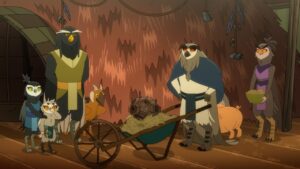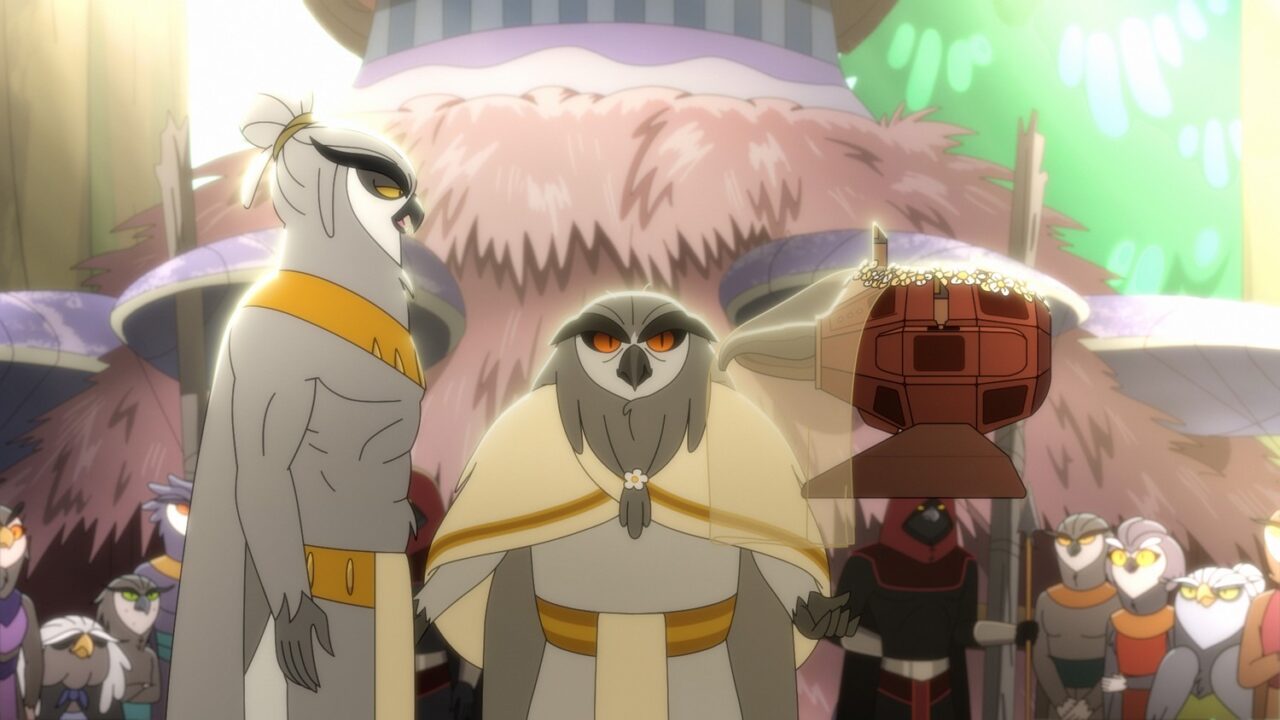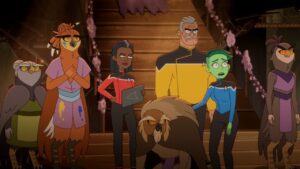Lower Decks skewers redemption arcs and colonialist tropes in an unusual yet hilarious episode
Let me start by saying “A Mathematically Perfect Redemption” is weird even by Lower Decks standards. Yet it’s this kind of over-the-top absurdity and humor that would only work in cartoon form that makes this show so enjoyable. In fact, I daresay this episode even went meta and made fun of some of Lower Decks’ own tropes.
The episode opens with a “previously on” that takes us back to the battle against the Pakleds in Season 1. An exocomp – a kind of sentient utility machine introduced in Star Trek: The Next Generation – named Peanut Hamper, who is an ensign on board the Cerritos, is called upon for a dangerous mission to save the Cerritos, and promptly abandons the ship to save herself.
Fast forward to this season. Peanut Hamper has been drifting alone in the debris field from the battle this entire time and working to repair a warp nacelle. In her loneliness, she has built an exocomp-like doll that she named Sophia, and at first seems to have a strong attachment to it. But the moment Drookmani scavengers show up, Peanut Hamper dumps Sophia to save herself using the scraped-together engine. It warps her uncontrollably through space, and eventually, she crash-lands on a primitive planet populated by bird people (for a moment, I wondered if they might be related to the Xindi-Avians of Star Trek: Enterprise that were never shown, but alas).
She awakens in a treehouse and is greeted by the village leader, Kaltorus of the Areore, who sees her arrival as destiny, a gift from the ancestors. Cue every single colonialist “character from advanced civilization meets primitive natives” cliche in the book. The villagers are skeptical of the mechanical being, especially Rawda, the stereotypical hot young prince figure. He’s a bird man (with the obligatory shirtless outfit to show off the six-pack), and she’s a talking metal box, but we all know where this is going to end up. Seriously, I could practically hear the artists giggling as they created this ridiculous character design.

Peanut Hamper impresses the villagers when she replicates some candy for a child but remains caustic and dismissive of what she sees as a boring backwater planet. Kaltorus tasks Rawda with showing Peanut Hamper their ways. He’s a prickly young male dedicated to his people, she’s a sass-mouthed young female with smarts on her side. Oh yeah, we all know where this is going. As Rawda shows Peanut Hamper around the village, where everything including the farm animals has wings, a sky snake (whose name Peanut Hamper mocks as redundant) attacks. Kaltorus shoots it down but is poisoned by its deadly venom, which no one has ever survived. Peanut Hamper promptly replicates an antidote, and the villagers rejoice.
Surrounded by praise, she seems to come around to the villagers’ way of life and takes on a healer role, even helping in a hatching process that usually sees a high infant mortality rate. The last one particularly impresses Rawda. He takes her on a flight across the sky and starts to sing… or, more accurately, squawk. Yup, it’s happening: The two fall in love after bonding over daddy issues. And of course, there’s a kiss. And sex. How does that work, you might wonder? Well, Peanut Hamper wonders that too as Rawda shows off his very different and, according to her, very complicated anatomy. Lower Decks fully leans into the ridiculousness of this pairing, to hilarious effect.
Rawda reveals that the reason he was so skeptical of Peanut Hamper is that his people have long been taught to fear technology. He shows her to an underground cave… It turns out, his people used to be an advanced, warp-capable society, but that led to endless wars, and so they chose to live a simple life. Some of these ancient ships remain beneath the village, and Peanut Hamper realizes she hasn’t violated the prime directive after all. Is anyone else getting flashbacks to Star Trek: Insurrection?

Cut to Peanut Hamper and Rawda getting married (because of course). The cliche is complete – the technologically advanced outsider has “gone native” and is settling into the “simple life” with the attractive indigenous person. Then, the Drookmani scavengers reappear to disrupt the ceremony. They’ve come for the underground ships under the belief that it is trash no one wants anyway, and they can take it with no problem. But of course, there is a problem: over the years, the trees have grown around the ships, and digging them up would destroy the village. Conflict!
The Drookmani start raising the ancient ships anyway, causing chaos. Trees fall, things catch on fire, and there are lots of crying baby birds. Up until this point, Peanut Hamper has refrained from sending a distress call to Starfleet, knowing she’ll face court martial and be sent to a penal colony for abandoning her post during the battle with the Pakleds. But that was the old Peanut Hamper! The newly redeemed Peanut Hamper is determined to save her new husband’s idyllic home no matter the cost to herself! She calls the Cerritos, and Captain Freeman, disturbed that Peanut Hamper appears to have violated the prime directive, orders the ship to her location.
The crew of the Cerritos realizes what the Drookmani are doing and prepare to save the day. But there’s no need – here comes Peanut Hamper in a heroic flight to save it first, choosing others over herself in the way she failed to during the Pakled battle! She boards the Drookmani ship and fights her way through it. From the ground, Rawda witnesses the ship’s destruction and despairs at Peanut Hamper’s apparent sacrifice. But wait – she survived!
The newlyweds are reunited, and Peanut Hamper gets a hero’s welcome. Freeman, Shaxs, and Tendi beam down, and the villagers protectively surround Peanut Hamper, having heard of her fears that she’d be sent to a penal colony. But Freeman isn’t here to arrest her – she’s here to thank her and invite her back to Starfleet. Rawda asks to come along as the devoted husband. Hooray, Peanut Hamper is redeemed by the power of love and colonialist fantasies!
And then the Drookmani show up in one of the ancient ships, having beamed aboard and made it operational, to reveal that they were invited to come to the planet to salvage the ship by none other than Peanut Hamper. TWIST! Turns out, Peanut Hamper arranged the whole attack so the Cerritos would witness her being a hero and get her off the planet without her getting in trouble. So much for redemption. Poor Rawda is heartbroken, and Peanut Hamper cruelly says that she has no interest in living the rest of her long robot life on this boring planet.

The Drookmani start attacking the Cerritos. Tendi points out that Peanut Hamper has one more chance at redemption: She can board the ship again and save the day! Here’s that heart-of-gold moment that Lower Decks has made such an integral part of its DNA – despite all of Peanut Hamper’s actions, she can still choose to do the right thing, and then we can all be one big, happy family!
Peanut Hamper’s response? NOPE. She’s only interested in saving herself. It’s Rawda who gets to be the hero, taking another one of his ancestor’s ships and using it to bring down the Drookmani. He returns to his village and declares that they will no longer live in fear of technology.
As for that selfish little robot? First, she tries to sweet-talk her way back into his good graces, but he kicks her to the curb. Freeman isn’t having any of her nonsense either. Peanut Hamper then lets loose the full extent of her evil robot-ness by trying to contact the Borg, who would love her. But the Cerritos crew, having had enough of her, disable her transmitter. She’s promptly shipped off to Starfleet’s Self-Aware Megalomaniacal Computer Storage, where she’s placed in the cell next to AGIMUS, the evil computer from Season 2.
This was definitely an unusual episode, in that our main characters are largely absent, and somehow felt even more bizarre than Lower Decks’ usual humor. It hilariously skewers so many tropes and cliches, it would take a novel to talk about them all. In particular, though it roasts the colonialist “going native” or “savior” narrative by appearing to give Peanut Hamper that storyline… then pulling the rug out from under it by revealing Peanut Hamper to be even eviler than before and letting Rawda save the day.
